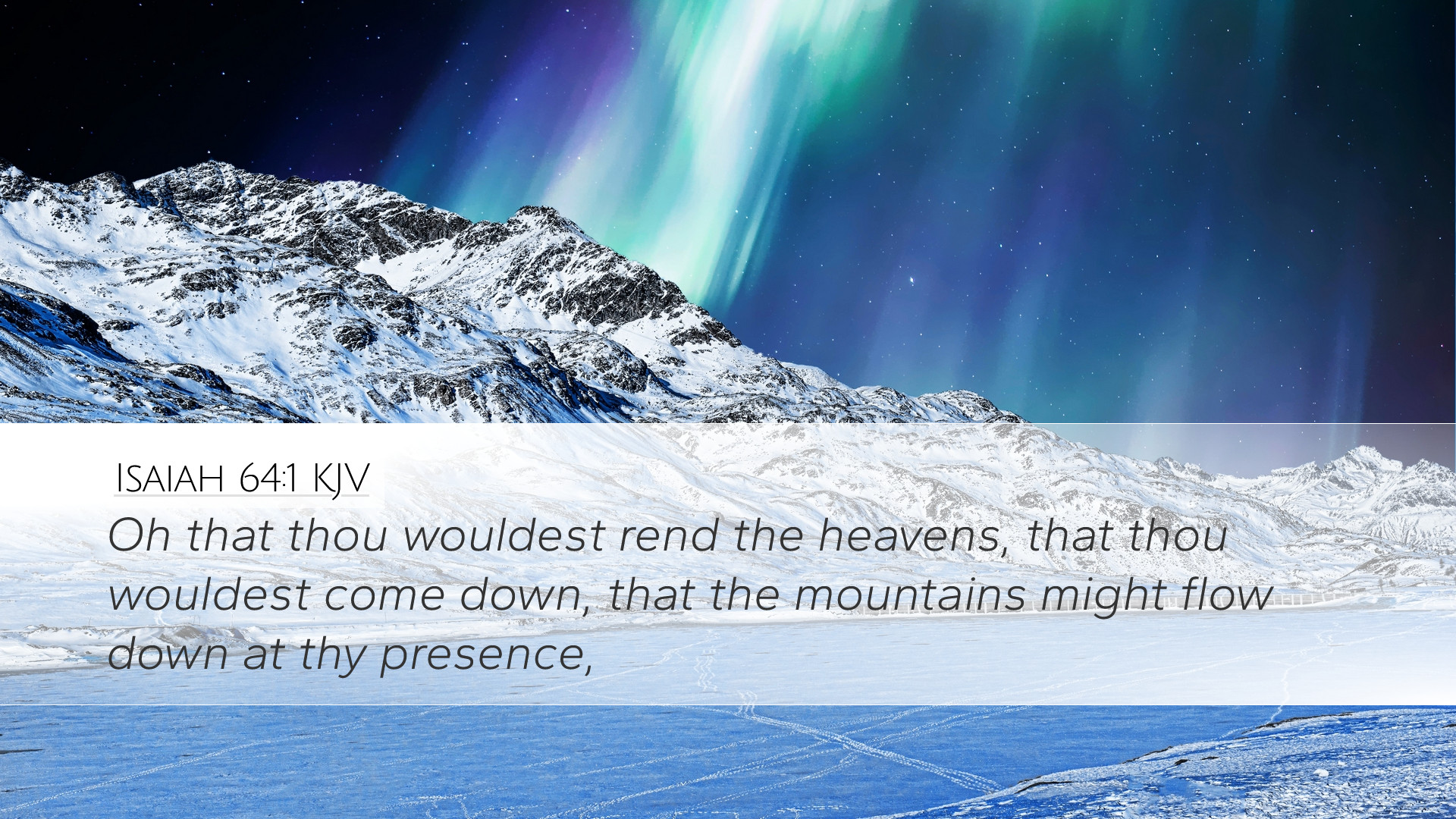Commentary on Isaiah 64:1
Text Reference: Isaiah 64:1 (KJV) - "Oh that thou wouldest rend the heavens, that thou wouldest come down, that the mountains might flow down at thy presence."
Introduction
This verse from the book of Isaiah expresses a passionate plea for divine intervention. It is a cry for God to reveal Himself in a tangible, powerful way. This commentary combines insights from prominent public domain sources to provide a comprehensive understanding of the verse's implications for believers, particularly pastors, students, and theologians.
Contextual Analysis
In the broader context of Isaiah, the prophet speaks to a nation in desperate need of redemption and a deeper experience of God's presence. This chapter, like many in Isaiah, reflects Israel’s longing for God's restoration after a period of spiritual decline.
Historical Background: The Israelites had experienced significant oppression and desolation. The cry in Isaiah 64:1 can thus be seen as a yearning for deliverance from their suffering and a return to divine favor.
Thematic Elements
- The Human Condition: The opening "Oh that thou wouldest" illustrates the depth of despair felt by the Israelites and represents humanity's fallen condition.
- Divine Majesty: The mention of "rend the heavens" suggests the transcendent nature of God, emphasizing His majesty and the need for Him to intervene in human affairs.
- Covenantal Relationship: The plea reflects the desire for God to act according to His covenant promises, reminding us of the ongoing relationship between God and Israel.
Verse Breakdown
"Oh that thou wouldest rend the heavens"
Matthew Henry highlights the urgency of this petition, pointing out that the act of rending the heavens symbolizes a dramatic entrance of God into human experience. It represents a desire for God to break through the barriers that prevent His presence from being felt among His people.
"that thou wouldest come down"
Albert Barnes notes that the phrase signifies a wish for God's physical and spiritual presence to be made manifest among His people. This longing for direct communion serves as a reminder that believers often seek a closer connection with God in their struggles.
"that the mountains might flow down at thy presence"
Adam Clarke interprets this imagery as a depiction of God's power. The mountains, often seen as immovable, represent the obstacles that stand in the way of God's work. The desire for them to "flow down" indicates a desire for God’s power to overcome all barriers.
Theological Implications
This verse underscores several important theological themes relevant to believers today:
- The Immanence of God: The longing for God to "come down" illustrates the necessity of experiencing God's presence in our daily lives.
- The Power of Prayer: This verse reflects the concept of intercessory prayer and the role of believers in pleading with God to intervene in their circumstances.
- Expectation of Divine Action: It also encapsulates the believer’s expectation that God will act in response to their cries, aligning with His character as a God who hears and responds.
Application for Pastors and Theologians
For pastors and theologians, Isaiah 64:1 serves as a foundational scripture for preaching and teaching about the necessity of seeking God's presence and intervention. The urgency in this verse should inspire a dedicated pursuit of prayer and dependence on God.
Encouragement for Prayer: The text can be employed to advocate for corporate and personal prayer movements within the church, facilitating a culture where believers collectively cry out for God's active presence.
The Role of Repentance: The verse also indicates a need for repentance and humility before God, as it reflects the awareness of sin and the need for divine mercy and restoration.
Conclusion
Isaiah 64:1 encapsulates a heartfelt plea for divine engagement. It serves as a timeless reminder of the believer's need for God’s presence and acts as an impetus for prayerful longing for His intervention in a broken world. By reflecting on this verse, we are encouraged to seek deeper communion with God and trust in His powerful ability to effect change in our lives and communities.


